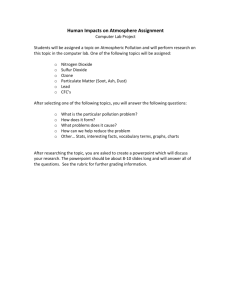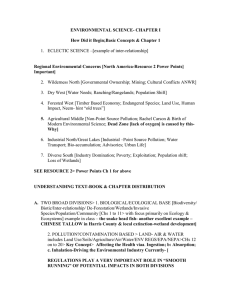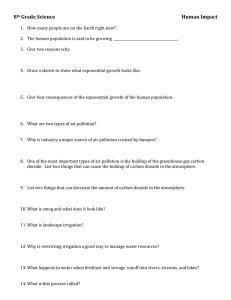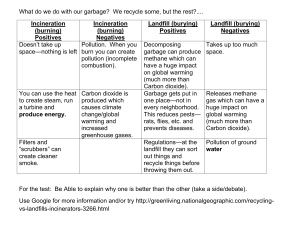Can this Muck Save the Planet - Wetlands
advertisement
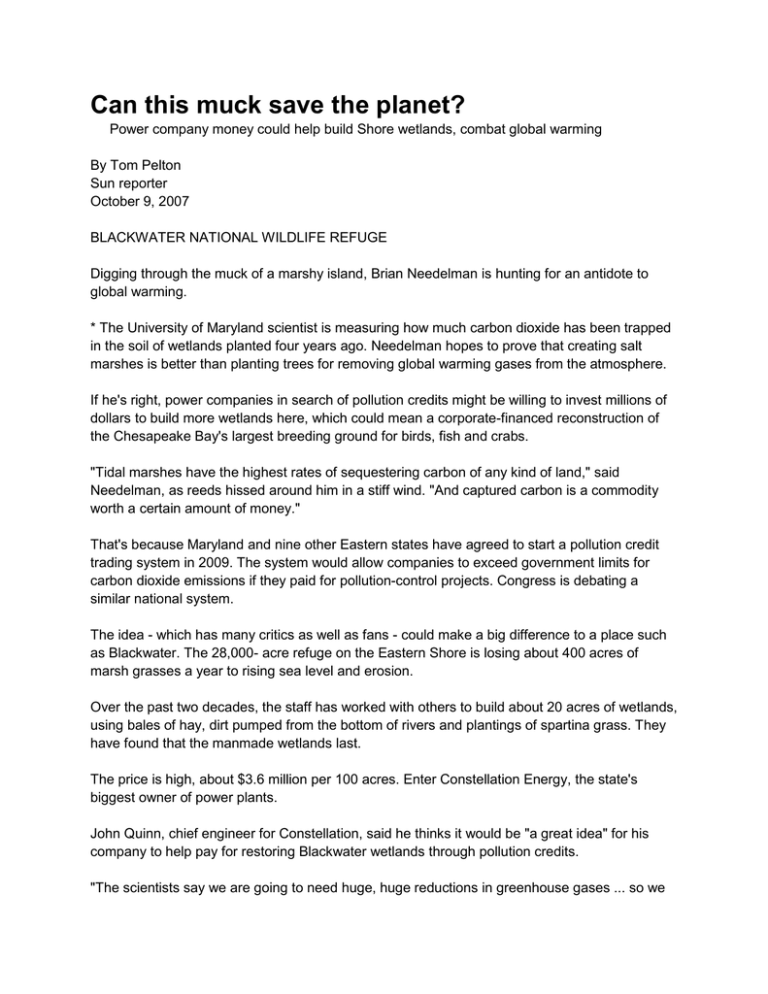
Can this muck save the planet? Power company money could help build Shore wetlands, combat global warming By Tom Pelton Sun reporter October 9, 2007 BLACKWATER NATIONAL WILDLIFE REFUGE Digging through the muck of a marshy island, Brian Needelman is hunting for an antidote to global warming. * The University of Maryland scientist is measuring how much carbon dioxide has been trapped in the soil of wetlands planted four years ago. Needelman hopes to prove that creating salt marshes is better than planting trees for removing global warming gases from the atmosphere. If he's right, power companies in search of pollution credits might be willing to invest millions of dollars to build more wetlands here, which could mean a corporate-financed reconstruction of the Chesapeake Bay's largest breeding ground for birds, fish and crabs. "Tidal marshes have the highest rates of sequestering carbon of any kind of land," said Needelman, as reeds hissed around him in a stiff wind. "And captured carbon is a commodity worth a certain amount of money." That's because Maryland and nine other Eastern states have agreed to start a pollution credit trading system in 2009. The system would allow companies to exceed government limits for carbon dioxide emissions if they paid for pollution-control projects. Congress is debating a similar national system. The idea - which has many critics as well as fans - could make a big difference to a place such as Blackwater. The 28,000- acre refuge on the Eastern Shore is losing about 400 acres of marsh grasses a year to rising sea level and erosion. Over the past two decades, the staff has worked with others to build about 20 acres of wetlands, using bales of hay, dirt pumped from the bottom of rivers and plantings of spartina grass. They have found that the manmade wetlands last. The price is high, about $3.6 million per 100 acres. Enter Constellation Energy, the state's biggest owner of power plants. John Quinn, chief engineer for Constellation, said he thinks it would be "a great idea" for his company to help pay for restoring Blackwater wetlands through pollution credits. "The scientists say we are going to need huge, huge reductions in greenhouse gases ... so we are going to have to have every tool available," he said. Constellation is contributing $100,000 to Needelman's state-funded research as part of a penalty for air-pollution violations at its coal-fired power plants near Baltimore. For years, scientists have known that wetlands are important as pollution filters. But as it turns out, Needelman said, salt marshes are better at capturing carbon dioxide than are forests, farms or grasslands. Most plants are good at absorbing the gases that cause global warming, in that they take in carbon dioxide during photosynthesis. But marsh grasses grow especially rapidly, meaning that they absorb more carbon. And unlike most areas, where leaves that fall to the ground release carbon dioxide into the air as they decompose, the water in marshes slows decay, which traps the carbon in the mud. Needelman is calculating exactly how much carbon is trapped. On a windy morning, he slogs through spartina grass in hip-length waders, carrying what looks like a two-handed sword. He plunges the tool, called a peat auger, into the mud and then examines cakelike layers captured in a V-shaped groove. Using a knife, he carves a black slice from the top. He explains that this is what is left of carbon dioxide absorbed by the marsh grasses over the past year. He will take the soil sample back to the lab to burn it and measure the amount of carbon dioxide released. The lump in his hand looks about as valuable as, well, dirt. But state and federal environmental policies could transform it into a precious commodity, a form of captured carbon that power companies would buy and sell like stock. In "cap and trade" systems, the government imposes limits on the amount of carbon dioxide or other pollutants a company can emit, then allows the company to pollute beyond those limits if it pays for projects such as planting trees. Alternatively, companies that exceed their limits can buy credits from cleaner companies that have emitted less than their pollution limits. Last year, Maryland's General Assembly passed the Healthy Air Act, a law that compels the state to join New York, Massachusetts and seven other Northeastern states in a pollution-credit trading system. It's designed to cut carbon dioxide emissions from power plants by 10 percent. In Europe, power companies profited handsomely from pollution credit trading after the European Union adopted carbon dioxide limits in 1997's Kyoto Protocol, said Josh Dorner, spokesman for the Sierra Club. "It was a huge profit scheme," Dorner said. "The power companies passed the cost on to their customers and made a huge windfall. ... They are looking at who they can pay for pollution credits instead of actually reducing emissions. That's the game." Whether restoring wetlands at Blackwater would help stop global warming might be beside the point, said John Sherwell, manager of the power plant program at the state Department of Natural Resources, which is providing $200,000 for Needelman's research. Persuading power companies to plant marsh grasses would help birds and fish in the region's most important wildlife refuge and create a cushion to help protect nearby Cambridge from hurricanes, he said. "There are a lot of collateral benefits that could come from restoring wetlands in the Blackwater," Sherwell said. Needelman's measurements are important, he said, because Maryland needs to convince the other states in the regional greenhouse gas coalition that planting wetlands is worth granting pollution credits. Squishing back to the water's edge, Needelman climbs into an airboat driven by a federal wildlife officer. A large fan at the back roars to life, and the boat pounds off across choppy waters. Its driver, Bill Giese, a wildlife manager at the refuge, stops and points to an eagle's nest high in a loblolly pine. Around it is a skeletal forest of white tree trunks rising from the water. Thirty-five years ago, this was a forest, he said, but the trees and the wetlands have been swallowed by a growing lake. As the marsh grass has disappeared, Giese said, so have the ducks, which need the grasses for food and shelter. Fish and crabs also rely on the wetlands. Giese likes the idea of having the power company pay to restore damage caused in part by global warming, which causes water levels to rise. "Nobody likes to see higher electricity prices, but we also want to have crabs and fish," he said, as a buzzard wheeled overhead. "And you've got to have marsh areas that provide these natural resources." tom.pelton@baltsun. com Copyright © 2007, The Baltimore Sun *** NOTICE: In accordance with Title 17 U.S.C. Section 107, this material is distributed, without profit, for research and educational purposes only. ***
